Above the Law? Extrajudicial killings of Blacks are increasing; activists say human rights crisis exists in America
By Ashahed M. Muhammad -Asst. Editor- | Last updated: Jul 17, 2012 - 12:33:49 PMPrinter Friendly Page
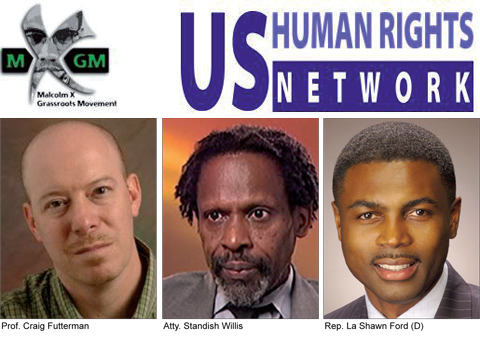 |
“Everyone has the right to life, liberty and security of person.”–Universal Declaration of Human Rights
“No one shall be arbitrarily deprived of his life.” –International Covenant on Civil and Political Rights
(FinalCall.com) - When George Zimmerman, a neighborhood watch volunteer, killed young Trayvon Martin in March of this year, sadly, members of the Black community were not surprised.
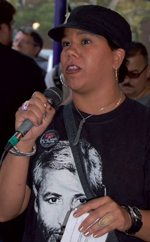 |
In their view, these types of killings were nothing new, the difference in this particular case was it became highly publicized. As more facts began to trickle out about the circumstances surrounding Trayvon’s death, many became outraged by what they called the callous disregard for Trayvon’s life and his right to defend himself. Additionally, the actions of Sanford, Florida law enforcement officials in dealing with Mr. Zimmerman raised suspicions that this would be another blatant case of injustice delivering yet another wound to the psyche of the Black community.
The narrative would be reinforced that this was not an isolated incident, and law enforcement has a “license to kill” when it comes to Blacks. The killing also hearkened back to a racially polarized time in the not so distant past, when it was nearly impossible for a White man to be charged with killing a Black man.
Those suspicions seem to have been verified with the recent release of a report compiled by the Malcolm X Grassroots Movement (MXGM) dealing with extrajudicial killings of Black people in 2012.
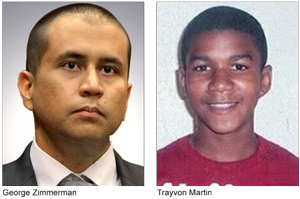 According to research from the New York Civil Liberties Union, in only the first three months of 2012, of the over 203,000 New Yorkers who were stopped by police, 89 percent of them were completely innocent. 87 percent of those stopped by police were Black or Latino. |
“Nowhere is a Black woman or man safe from racial profiling, invasive policing, constant surveillance, and overriding suspicion,” said Rosa Clemente of the Malcolm X Grassroots Movement. “All Black people—regardless of education, class, occupation, behavior or dress—are subject to the whims of the police in this epidemic of state initiated or condoned violence,” she added.
Activists say a human rights issue confronts Black America, and is on par with abuses taking place in other parts of the globe. The MXGM’s research report states: “The oppression and police occupation of Black communities parallels the brutalization, denial of human rights and killings being committed by the Israeli occupying forces in Palestine, and the persecution of Afrodescendants in Columbia and the Indigenous peoples of Brazil over the past several years.”
Atty. Standish Willis of the National Conference of Black Lawyers traveled to Geneva, Switzerland in 2008 and was successful in bringing American cases of torture representing those seeking justice for decades to the United Nations. He said there are parallels in the struggle by Black people in the United States and the colonial experience of Blacks on the continent.
“It’s very analogous if you study the African colonialist experience,” said Atty. Willis. “Blacks have been victims of this since we have been here in this country,” said Atty. Willis. “In some ways we can definitely say African-Americans are in a colonial relationship in terms of police.”
International law experts have struggled to define the term “extrajudicial killing” however, the United Nations Special Rapporteur on extrajudicial, summary or arbitrary executions defines them in part as: “Deaths due to the use of force by law enforcement officials or persons acting indirect or in direct compliance with the State, when the use of force is inconsistent with the criteria of absolute necessity and proportionality.” The UN Special Rapporteur also pointed to “the misperception that increased use of lethal force by law enforcement authorities is a necessary and effective response to situations of endemic criminality, and that greater respect for suspects’ individual rights must necessarily come at a cost to public security.”
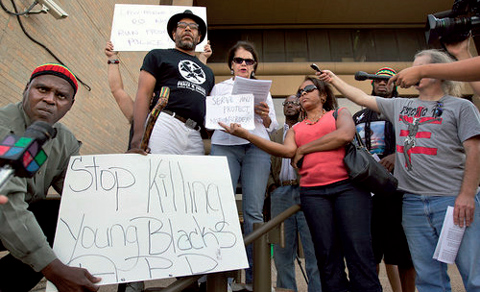
Calls for police to stop the killing of young Blacks. Photo: mxgm.org
According to data contained in the MXGM’s report: 80 percent of those killed were under the age of 30, a large majority were met with lethal force by law enforcement although they were not armed, and nearly all were Black males. |
According to information found in the United Nations Special Rapporteur on Extrajudicial Executions handbook: “High numbers of police killings are also often seen in countries with high crime rates, and especially where there are high levels of violent or street crime, and where there are organized or semi-organized violent gangs or militias. While police forces face many challenges in insecure environments, some governments and police forces fail to prepare appropriate crime-control strategies, and instead opt to use unlawful, short-term and heavy-handed tactics against alleged criminals. Killings can also be encouraged where there is high-level political or public support for violent policing. Senior police officers or officials can contribute to the number of police killings by tacitly approving of or openly encouraging them.”
It is no secret that racial profiling is a fundamental pillar of law enforcement strategies nationwide. Race is a dominant factor in the controversial “stop and frisk” policies that have recently come under fire from human rights organizations mainly in New York but also in other American cities.
According to research from the New York Civil Liberties Union, in only the first three months of 2012, of the over 203,000 New Yorkers who were stopped by police, 89 percent of them were completely innocent. 87 percent of those stopped by police were Black or Latino.
Craig Futterman, clinical professor of law and director of the Civil Rights and Police Accountability Project at the Edwin F. Mandel Legal Aid Clinic has conducted extensive research in the area of police misconduct. He has found lenient disciplinary actions in cases where excessive force was reported and an attitude of authoritarian impunity running rampant throughout police forces. Though much of his research has focused on the Chicago Police Department, Prof. Futterman told The Final Call, things are the same in major cities nationwide.
- A Washington, D.C. police officer reportedly said he would shoot first lady Michelle Obama and actually showed a gun
- A police officer in New York accused of ticket fixing was also accused of conspiring with his wife to murder a witness.
- In Philadelphia, an officer was arrested and charged with stealing money from a woman who was in temporary custody.
- In South Carolina, an officer was arrested July 2 and charged with engaging “in numerous drug transactions,” while on duty and providing “law enforcement sensitive information to individual(s) not authorized to receive the information.” He has since been fired, and these are far from the only instances of police misconduct.
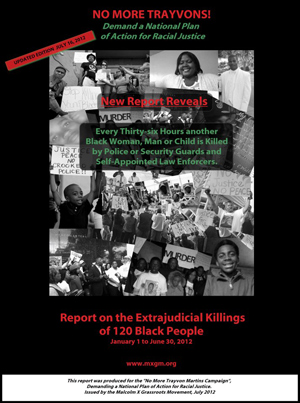 |
Research shows there are many ways in which race impacts people’s behavior and decision-making, including law enforcement officers, he said.
“Police officers when seeing particularly a young Black or Brown man are far more likely to perceive that young man as a potential criminal or a potential danger, and that also makes that police officer far more likely to feel threatened and far more likely to shoot,” said Prof. Futterman.
According to data contained in the MXGM’s report: 71 percent of those killed were under the age of 31, a large majority were met with lethal force by law enforcement although they were not armed, and nearly all were Black males. Atty. Willis said this is consistent with what he has experienced, because in his over three-decades of suing police for misconduct, only one time has the officer been convicted. Judges typically come down on the side of law enforcement, he said. An officer is more likely to be sent to jail for committing a financial crime—such as shaking down a drug dealer—than for killing Black people, said Atty. Willis adding that not only do White officers escape punishment for killing Black people, Black officers also know they can get away with shooting down other Blacks, and often do.
While acknowledging the tragic killings outlined in the report, many believe an emphasis should also be placed on the number of Blacks mercilessly slain by other Blacks in urban areas across the country.
State Rep. La Shawn K. Ford, who lives in and represents one of the most crime-ridden areas of Chicago’s Westside, pointed this out in a statement following the tragic killing of seven-year-old Heaven Sutton, shot while selling candy in her front yard.
“Ninety-three percent of Blacks that are murdered are killed by other Blacks! Ninety-three percent of Black murder victims are killed by Black hands!” Rep. Ford emphasized.
Prof. Futterman said a balanced approach is needed in dealing with the violence.
“There is real violence that is unacceptable and needs to be addressed. Once of our children being killed is one too many as far as I’m concerned,” said Prof. Futterman. “When I call strongly for police accountability, I believe equally that we as a community are also accountable and need to be responsible for one another,” he added.
In the Honorable Minister Louis Farrakhan’s book titled “Justifiable Homicide: Black Youth in Peril” he discussed the racial profiling taking place in the cities of America and warned the Black communities nationwide recently in a July 6 WVON 1690AM interview with Cliff Kelley. Specialized training is taking place in highly militarized police forces in the cities of America, he said. “A slaughter is on the way if we don’t make the change now,” the Minister said.
Community activist Wallace “Gator” Bradley says decades of torture and corruption by members of the Chicago Police Department have not been fully addressed, sending a message to the Black and Latino community that law enforcement officials are “above the law.” Emboldened, they continue to use excessive and even lethal force, which exacerbates tensions and increases distrust of police in the Black community, said activists.
“I have yet to hear (Chicago Mayor) Rahm Emanuel say anything in reference to the cover-up of the torture by Jon Burge and former Mayor Daley of the torture of 150 Black men,” said Mr. Bradley. “How are you going to have a trust factor, when you see them doing all this wrong?” he asked.
“The likelihood of an officer being disciplined for abusing his or her police power is very close to zero in Chicago in particular, but it’s a national phenomenon,” Prof. Futterman observed, “that’s a national issue. It’s an age old question of who polices the police?”
Prof. Futterman said there is “a completely different reality” for many of the White middle and upper class students he teaches at the University of Chicago and what is experienced in predominately Black and Latino areas in the city. He often sends his law students to have discussions with students attending predominately Black inner-city high schools. The Black male students routinely describe being harassed by police and consider it “normal” to be stopped and frisked. He said the White students are often “blown away by that” since most of the White students have never even been pulled over.
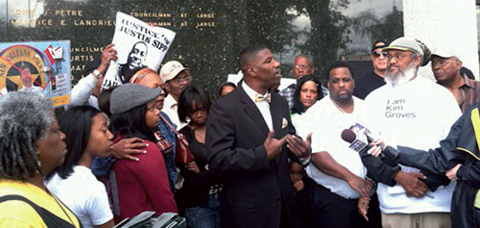
New Orleans protest against unjust killings. Photo: mxgm.org
|
According to the CATO Institute’s National Police Misconduct Reporting Project, incidents in which law enforcement officials are alleged to have violated their positions of trust and authority occur regularly nationwide. For example:
On July 10, the United States Justice Department and the Federal Bureau of Investigations announced the launching of a comprehensive review of thousands of criminal cases to determine if flawed forensic evidence could have resulted in wrongful convictions.
Human rights activists believe the institutional racism found in crackdowns like the “war on drugs,” “three-strikes laws” and mandatory minimum sentencing reinforces the “thug” narrative permeating the culture of law enforcement, leading to these types of killings. They say this report “proves beyond a shadow of a doubt that the institutionalized violence of White supremacy is not only alive and well, but is, in fact, intensifying.”
Rep. Ford was careful to point out that he is aware of the unequal dispensation of justice that remains a problem in American society.
“Incarceration is a big problem in American society, but it is even a bigger problem in the Black community,” he said. “The worst thing is that a lot of these men are excessively punished for crimes that may not have warranted such harsh punishment. This is true in Black and Latino communities; more prisons than schools are being populated from people from our neighborhoods,” said Rep. Ford.
The MXGM and a unified group of activists have called for the Black community to organize for its own self-defense as well as the creation of “broad mass-movement” resulting in “transformative legislation” that could include a National Plan of Action for Racial Justice.
Prof. Futterman sounded a hopeful note saying the protections outlined in the United States Constitution should protect White, Black, Brown, rich or poor. He called it an issue of “basic fundamental fairness” that everyone should be treated with dignity and respect, and called on law enforcement to make the needed adjustments.
“The vast majority of officers are not out there abusing people, but there are a small percentage though who are and have been allowed by their departments to abuse with impunity. It’s not that difficult to identify and address the abusive, corrupt, and racist officers that exist in our midst,” said Prof. Futterman. “That would do a heck of a lot of good towards restoring trust between police and community members and improving public safety overall,” he added.
(Read the entire report at http://www.finalcall.com/reports/MXGM.PDF)
Related news:
Police State U.S.A: Can it be prevented? (FCN, 06-06-2012)
FinalCall.com Special Report on the NDAA (FCN, 01-10-2012)
No comments:
Post a Comment